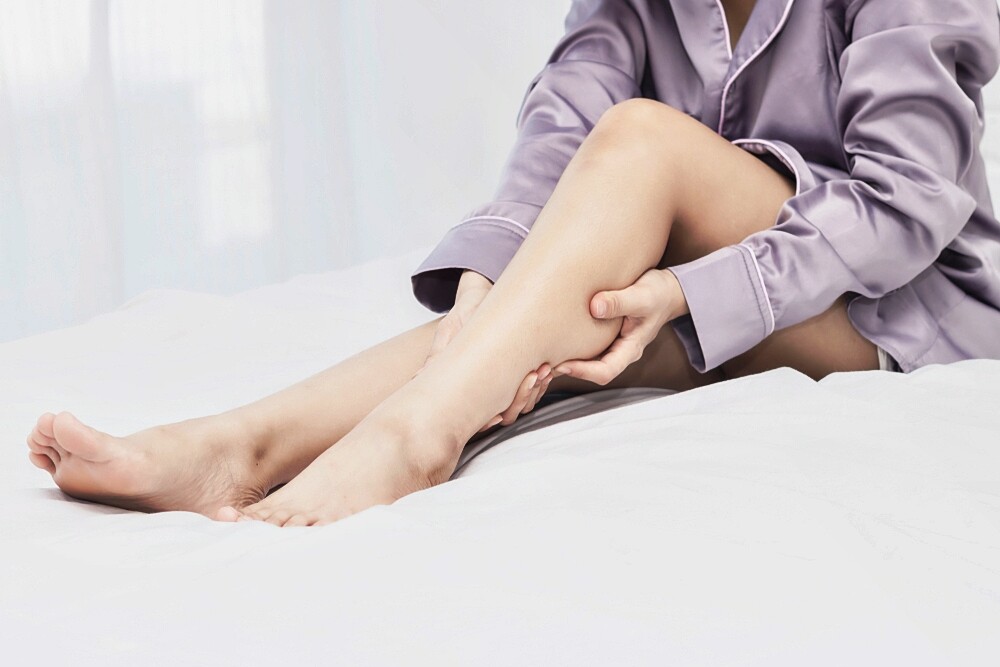If leg cramps occur at night, there can be various causes. Here you can find out possible triggers and what can help.
Just a moment ago you were sleeping relaxed and calm, then suddenly cramps in the muscles occur and cause great pain. Often the legs are affected – especially the calves. And often these calf cramps occur at night and tear us out of our sleep. There can be many reasons for this, but relatively often a lack of magnesium is behind night-time calf cramps. Women tend to be affected more often, but the risk also increases with age.
How do leg cramps generally occur?
In general, certain muscles contract during a cramp. If the so-called large calf muscles are affected, they harden due to calf cramps – and usually remain hard for a few days. The so-called toe flexor, which starts at the back of the lower leg, is also frequently affected. For nocturnal calf cramps one can even develop a so-called cramp tendency. This means that the affected muscles contract at the same place over and over again.
Why a lack of magnesium causes leg cramps
Magnesium has various functions in the body. Among other things, it acts as an antagonist of calcium: while calcium is responsible for tensing the muscles, magnesium is supposed to relax them again afterwards. If the body lacks magnesium, calcium ensures that the nerves start to contract involuntarily – and the cramps begin. This is why frequent calf cramps are a typical first sign of a magnesium deficiency and a generally unbalanced electrolyte balance.
And why do these leg cramps occur at night?
There is another mechanism that plays a role in this: the body’s magnesium level also falls naturally during rest phases. However, it can also fall too low, which can cause muscle contractions when unconsciously moving during sleep. As a rule, we do not wake up until the muscle is already hardened and severe pain develops.
And how does a magnesium deficiency develop?
In general, there are three possible triggers for a magnesium deficiency:
- An increased need, for example due to pregnancy. Especially in the last trimester of pregnancy the need for magnesium is very high. But athletes also have a higher requirement because the muscles use up the magnesium available in the body more quickly during training.
- An increased excretion of magnesium, which can also affect athletes. This is because during training minerals are excreted through sweating. But various drugs can also accelerate the excretion of minerals.
- Inhibited absorption of magnesium by the body, for example as a result of illness.
Nocturnal leg cramps: Other causes at a glance
For leg cramps (but also general cramps in the muscles) there can be other causes besides a lack of nutrients. These include:
- Muscle overload in athletes: Those who train a lot and do not allow their muscles to rest in between have an increased risk of calf cramps at night.
- Muscle overload in non-athletes: Those who do not exercise at all also suffer more from calf cramps. It also plays a role here that muscles tend to shorten when not exercising.
- Poor posture: If posture is poor, the same muscles are always under tension, which can lead to muscle cramps.
- Wrong footwear: If the feet and legs are unilaterally strained by the wrong footwear, this can promote calf cramps. This applies to shoes with high heels, for example.
- Unilateral diet: The body only gets all the nutrients it needs if we eat a balanced diet.
- Lack of fluids: If we drink too little, this can have serious health consequences. Nightly calf cramps are only one of them.
Treatment: First aid against leg cramps
Although calf cramps are often raid-like, most people instinctively apply the right remedy by stretching the calf muscles. The leg is stretched out, the heel is pushed forward and the toes are pulled towards the body. You can also use your hands to help. In most cases this is enough to dissolve the cramp after a short time. It can also help to massage the affected muscle slightly, shake the legs a little or stand up and walk around carefully.
Preventing nightly leg cramps at night
If the cramps only occur from time to time, it doesn’t have to mean anything bad. However, if calf cramps occur regularly at night, you should consult a doctor to find out the possible causes. If there is an illness as a trigger, it must first be treated. Otherwise it often helps to adjust your lifestyle a little. The following measures can help:
- Eat a balanced diet: For a balanced diet we should eat lots of fruit and vegetables. Dairy products and plenty of fish should also be on the menu, as should some lean meat. We can take in important dietary fibres through wholemeal products, for example.
- Drink a lot: To ensure that we are optimally supplied with fluids, we should drink at least 2.5 litres a day. Above all water, but also herbal tea is allowed.
- Avoiding stimulants: We should avoid smoking and alcohol as much as possible. This is generally better for your health, but alcohol in particular can also promote calf cramps as it has a dehydrating effect.
- Exercise: If you hardly move at all in everyday life, you should definitely create some time for short training units. Those who exercise for 30 minutes three times a week do a lot for their health. Enthusiastic athletes, on the other hand, need to take breaks between workouts. In the worst case, exaggerating can be just as harmful as not exercising at all.
- Loosen muscles: Apart from classical training, it is important not to go to bed with tense muscles. Short relaxation and stretching exercises before going to bed can already help here. But we shouldn’t break out in a sweat, this only stimulates the body and prevents tiredness.

